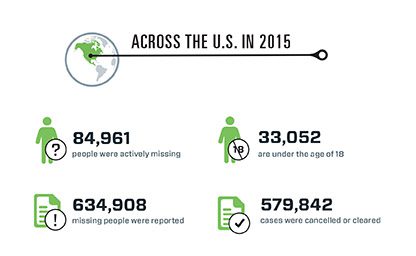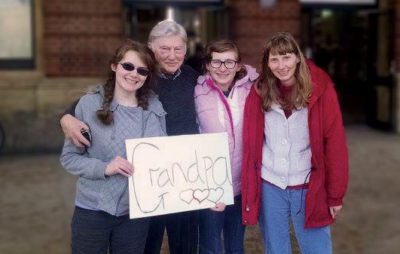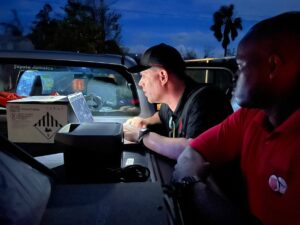“Family is what drives these searches. People might have everything else in place—their finances, shelter, food—but without that relative, they just don’t feel complete.”
Since the 1880s, The Salvation Army has worked to find missing loved ones and complete families.
In one corner of the 11th floor of a nondescript office tower in downtown Long Beach, Calif., sits a handful of caseworkers, their cubicles lined with framed photos of happy families. In and of itself, that’s no unusual sight—except none these families happen to be their own.
This is The Salvation Army’s Missing Persons Program, one of only three organizations that conduct human searches on a global scale, alongside the International Committee of the Red Cross (used in cases of separation caused by natural disaster or political conflict) and the International Social Service. A small unit based out of the Army’s Western Territorial Headquarters, the Missing Persons bureau serves with the sole mandate to reconnect and reunite lost loved ones.
 “What I love is that our search efforts are purely humanitarian,” said caseworker Venecia Arzola. “It is safe to say that the individuals sought out by our department are valuable to someone.”
“What I love is that our search efforts are purely humanitarian,” said caseworker Venecia Arzola. “It is safe to say that the individuals sought out by our department are valuable to someone.”
According to the most recent report from the FBI’s National Crime Information Center, nearly 85,000 people are actively missing in the United States, almost 39 percent of whom are under 18. Of the approximately 2,000 inquiries Arzola’s Missing Persons Department receives each year, The Salvation Army opens roughly 600 new cases and locates an average of 350 people.
This is not a new development. The Salvation Army began strategically looking for missing persons under the direction of founder William Booth.
In Victorian England, young people often left the provinces to follow advertisements for work in London, notes Bramwell Pratt in “God’s Private Eye” (Campfield Press, 1988). Many ended up in brothels and other exploitative situations, cut off from their families. “As William Booth’s concern for social conditions became more widely known to the general public, so requests came in from anxious parents pleading for help in dealing with the problem of missing daughters in London,” Pratt writes.
Booth appealed through The War Cry, then a weekly newsletter, for all Salvationists to cooperate in setting up a system through which urgent inquiries could be addressed, and an “Enquiry Department” was established under the direction of Florence Booth, wife of Booth’s son, Bramwell. Details of missing persons were listed weekly in The War Cry, one of the earliest appearing in October 1885 on behalf of a husband whose wife had disappeared.
Similar departments soon opened in New York, Chicago, Toronto, Melbourne and Sydney.
“I feel a lot of excitement when we locate someone who’s willing to be in touch with their relative,” Arzola said. “When we can finally complete whatever missing link they’re looking for, whatever unanswered questions it may be, we’re helping to fulfill something in them.”
By the time an individual reaches Arzola, he or she has typically exhausted all of the available resources to locate a loved one. Arzola then serves as the “go-between” for the inquirer, private investigators and missing person to allow confidentiality and complete anonymity.
Searches are conducted using a variety of methods—tracing previous residences, credit institutions, utility bills, law enforcement personnel and social service agencies—that allow Arzola’s office to follow a paper trail to a person.
Yet, the department does not handle cases for mysterious disappearances, foul play, divorce or in circumstances that are for financial gain, such as spousal alimony or child support.
“Booth wanted to help parents find their kids, and it’s a need that still exists today,” Arzola said. “Family is what drives these searches. People might have everything else in place—their finances, shelter, food—but without that relative, they just don’t feel complete.”
“It is our hope to give the inquiring relative some type of closure, even if the missing person is deceased or desires no contact,” Arzola said. “Sometimes it can be a hard answer, but an answer is better than the unknown.”
Finding my dad
By Lisa Culbertson
In August 1993, I lived in England and was marrying an American. I decided just a few weeks before the ceremony that I wanted nothing to do with my dad, so he did not give me away at my wedding.

In truth, I felt I did not need a dad anymore and that I had moved on with my new life. But it is amazing how the very things you don’t think you need are the ones you need the most.
In 2010, I became a single mother with two daughters, living in North Carolina. Around the same time, I heard my brother took his own life. The year before his wife had died of cancer. I never made it home to either of their funerals, and my brother’s three boys went into foster care, all of this unknown to my dad.
I decided that my dad had the right to know that his son had died, so I contacted The Salvation Army Missing Persons Program. After a couple of years, a letter arrived. My dad wished me well, but did not, at that moment, want to reconnect. My heart sank, although I told my girls that this was God’s answer.
A few months later, before Christmas, my dad wrote that he had just lost his second wife to cancer. This started several letters back and forth from California to England. Eventually, my dad gave us his telephone number. I remember calling him for the first time. It felt straight from a movie, hearing his voice for the first time in years.The Salvation Army opened an Enquiry Department in the 1880s to help find missing persons with three objectives:
Researching to trace the relatives over the age of 17 years for the renewal of relationships.
Relieving the anxiety and distress of relatives concerned for the one who is missing.
Resolving the problem responsible for the separation.
SOURCE: “God’s Private Eye” (Campfield Press, 1988)
My girls and I began holding yard sales to raise money to visit England, and many friends also chipped in. On March 4, 2015, we boarded a plane. After many hours of traveling, I saw my dad for the first time in 22 years and my girls met him for the first time. It was magical and a miracle. I wanted to hold onto the moment forever.
The nearly two weeks my girls and I spent with him in Norfolk were priceless. I wanted to bottle every moment up. We laughed, walked along beaches and through woods. For once in my life, I felt like I belonged. My girls say it was the best time in their lives. My younger daughter even wrote a song about seeing him.
It’s been a little over a year since that trip, and I will never regret the amount of yard sales we did, the letter I sent, nor the trip we took. Both of our lives became busy—my dad in a new relationship and my daughter going to college.
Although he says he loves us, and not to think anything less, it just is not the same.
I wanted a dad so much in my life that I forgot, sadly, that people are human and that 3,000 miles away means that what you might want they might not be able to give you.
The girls and I plan to go back to England in April 2017 when I turn 50, and I am sure my dad and I will meet up.
I would highly recommend that people search for their families and reconnect, whatever the outcome; it is better to have tried than not at all. I think it is also better to forgive than to live a life full of bitterness and regrets.
So once again, thank you to The Salvation Army. You, indeed, made me move on in my life and in some way allowed me to see me. I will never forget the memories nor God’s grace. The girls and I feel for that moment in time, we lived in a piece of heaven on earth. One simple letter helped me to not live with regrets.
Give this program a chance if you are looking for a loved one, and may God bless you as you move on.
With reporting by Stephanie Mercado
[button color=”black” size=”normal” alignment=”none” rel=”follow” openin=”newwindow” url=”usw.salvationarmy.org”]If you are looking for a lost loved one, visit usw.salvationarmy.org or contact missing.persons@usw.salvationarmy.org for more information. [/button]











